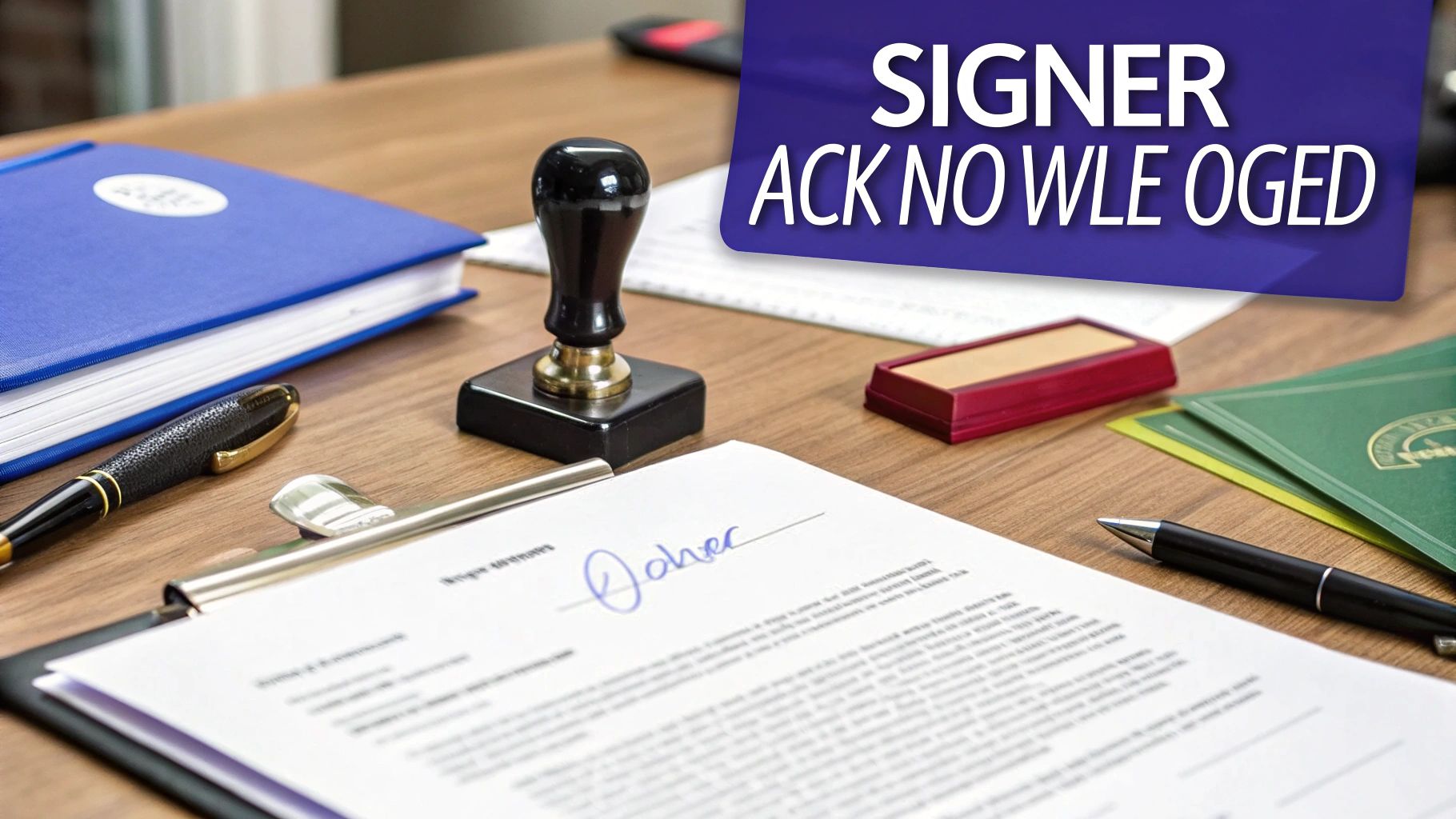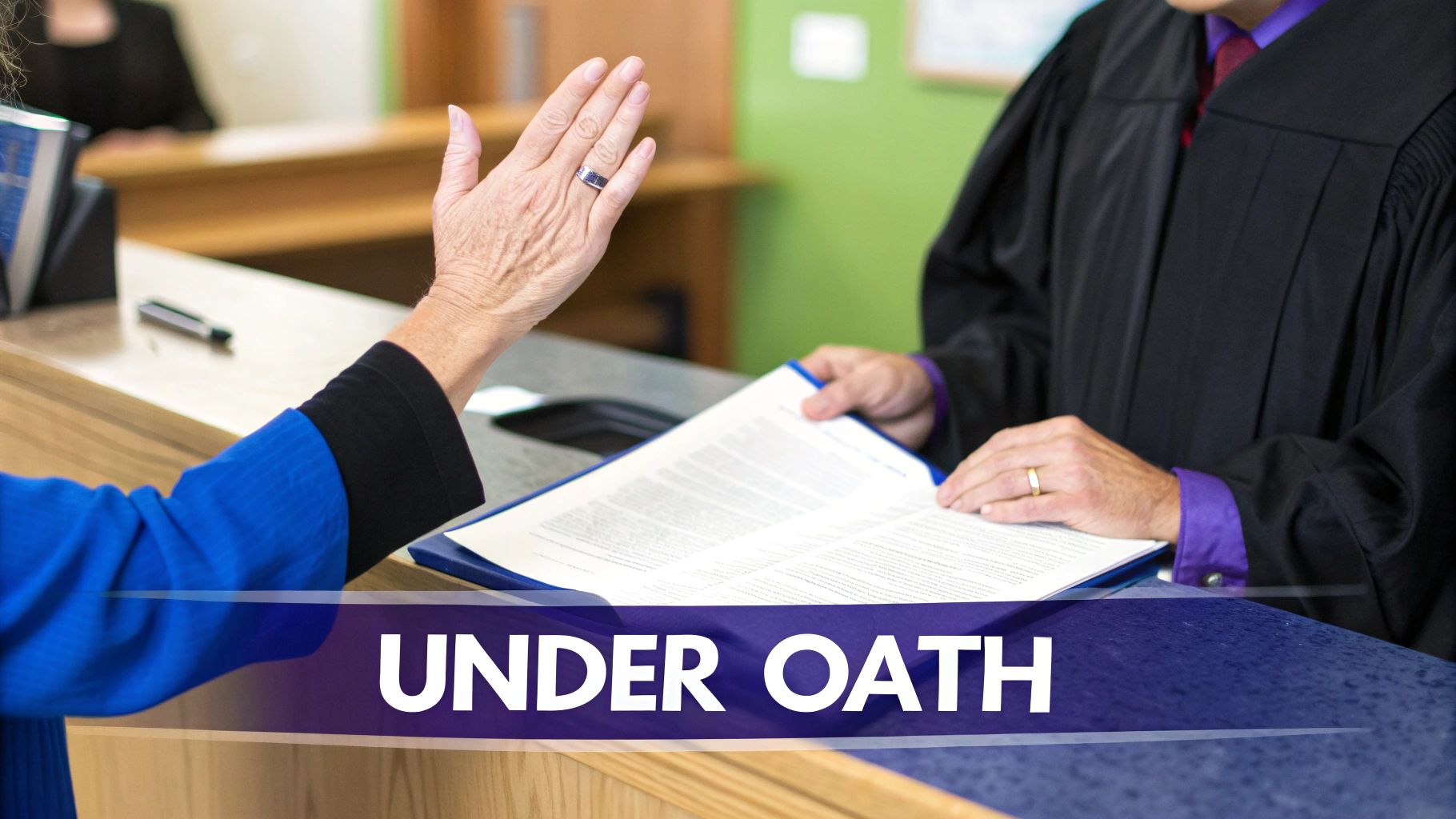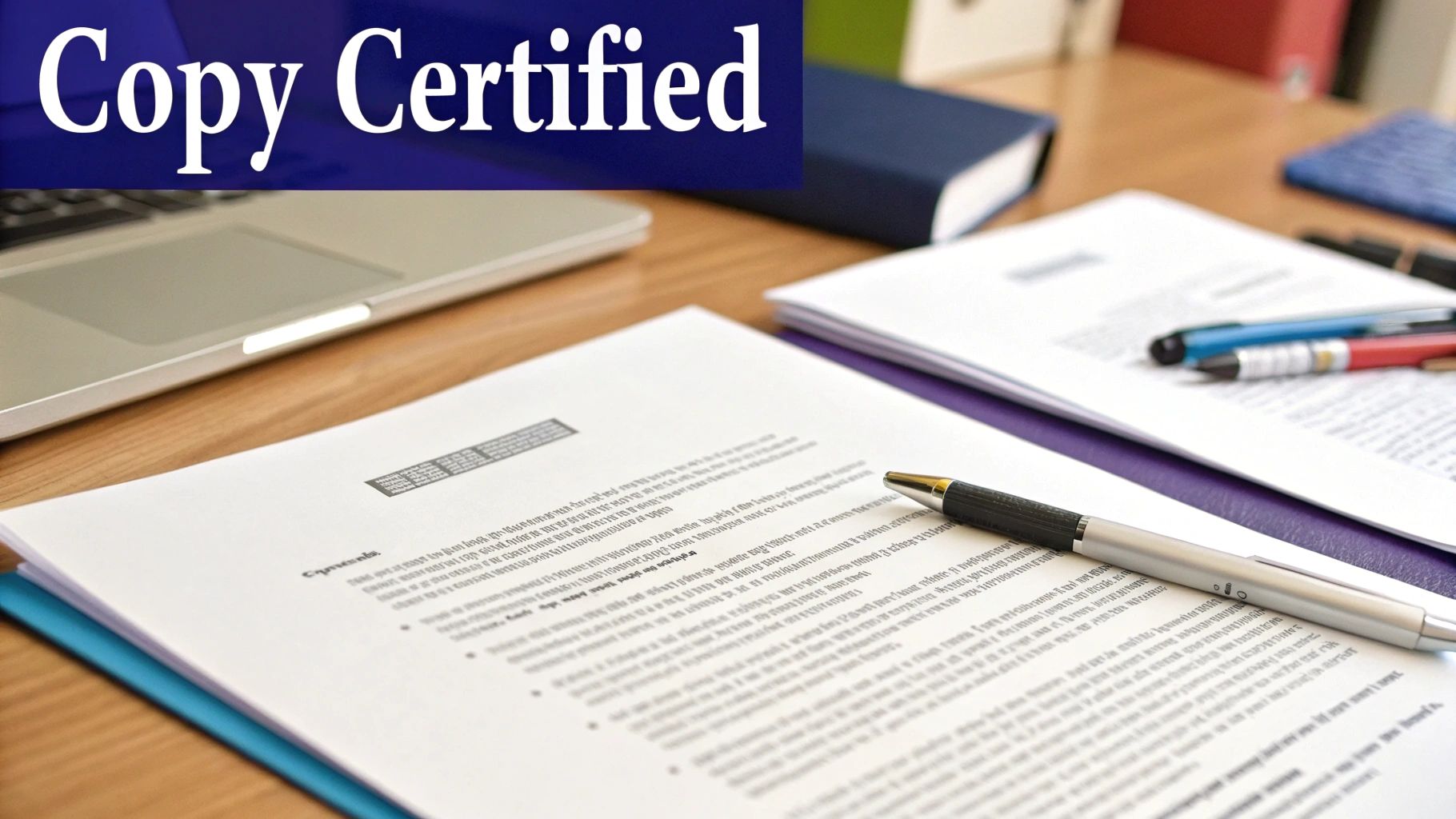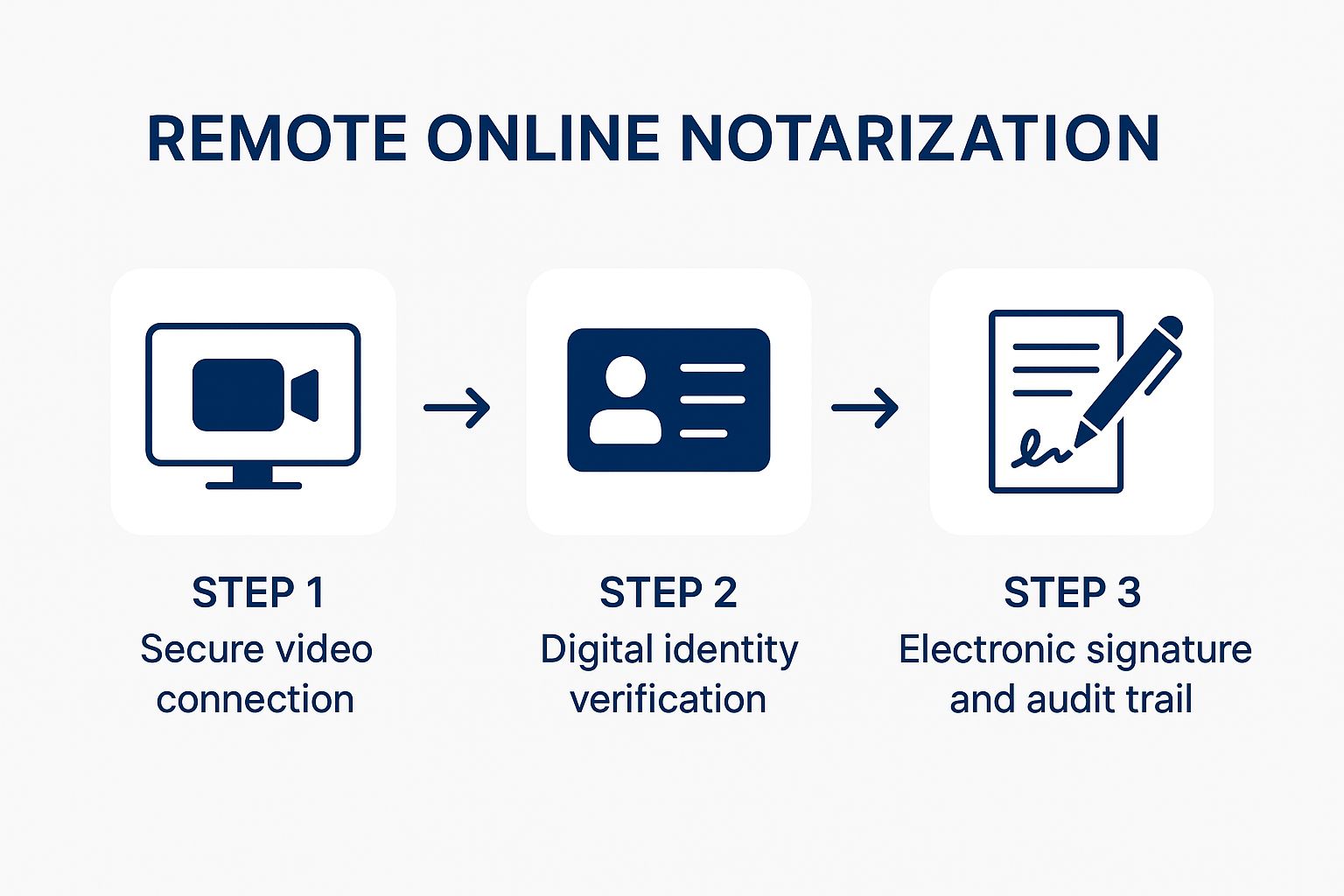6 Notarial Certificate Sample Templates for 2025
- WebsiteFix Technical Partner
- Jul 9, 2025
- 13 min read
Navigating the world of notarization can feel complex, but at the heart of every official act lies a crucial component: the notarial certificate. This block of text, appended to a document by a Notary Public, is what gives the notarization its legal weight. It specifies exactly what the notary witnessed, whether it was verifying a signature, administering an oath, or certifying a copy. Without the correct certificate wording, a document can be rejected, causing significant delays and complications for legal, financial, and personal matters.
This guide is designed to provide clarity and practical tools for anyone needing to understand or use these essential documents. We will break down the most common types of notarial certificates, providing a clear notarial certificate sample for each one. You will learn the specific purpose of an Acknowledgment versus a Jurat, when a Copy Certification is appropriate, and how modern Remote Online Notarization (RON) certificates are structured. Each example includes a detailed analysis, strategic insights, and actionable takeaways to ensure you select and use the correct certificate every time. This resource eliminates guesswork, empowering you to handle your documents with confidence and precision.
1. Acknowledgment Certificate
The acknowledgment is arguably the most fundamental and frequently used notarial act. It serves as a formal declaration by a document signer, made before a notary public, that their signature was affixed willingly and for the purposes outlined in the document. The notary's role is not to validate the document's content but to verify the identity of the person signing and to witness their acknowledgment of the signature. This process adds a critical layer of fraud deterrence to important transactions.

Acknowledgment Sample Wording
The precise wording for an acknowledgment certificate varies by state law. However, a common format will include the venue (state and county), the date, the notary's name, the signer's name, and a statement confirming the signer personally appeared and acknowledged their signature. Here is a generic notarial certificate sample for an acknowledgment:
State of [State] County of [County] On this ____ day of __________, 20__, before me, [Notary's Name], a Notary Public, personally appeared [Signer's Name], who proved to me on the basis of satisfactory evidence to be the person(s) whose name(s) is/are subscribed to the within instrument and acknowledged to me that he/she/they executed the same in his/her/their authorized capacity(ies), and that by his/her/their signature(s) on the instrument the person(s), or the entity upon behalf of which the person(s) acted, executed the instrument. WITNESS my hand and official seal. \_______________________ Notary Public Signature
Strategic Breakdown and Best Practices
An acknowledgment is required for documents where the authenticity of the signature is paramount. The signer doesn't need to sign in the notary's presence, but they must appear before the notary to acknowledge their prior signature.
When to Use: This certificate is essential for legally binding documents like real estate deeds, mortgages, powers of attorney, and business contracts. It provides court-admissible evidence that the signature is not a forgery.
Actionable Tips for Signers: Always bring a valid, government-issued photo ID. Ensure the name on your ID matches the name printed on the document precisely to avoid any complications.
Key Insight for Notaries: Never notarize a signature on a blank or incomplete document. Your primary duty is to verify the signer's identity and awareness. Understanding this foundational role is crucial, as you can learn more about the importance of a Notary Public for legal documentation. You must use the exact certificate wording mandated by your commissioning state's laws to ensure the notarization is legally valid.
2. Jurat Certificate
A jurat is a notarial certificate used when a signer must swear or affirm under oath that the contents of a document are true and correct. Unlike an acknowledgment, which focuses on the identity and willingness of the signer, the jurat is concerned with the veracity of the document's statements. The notary public administers a formal oath or affirmation to the signer, who then signs the document in the notary's presence, attesting to the truthfulness of the information provided. This act transforms a simple statement into a sworn testimony.

Jurat Sample Wording
Jurat wording is strictly regulated by state law, and notaries must use the exact format prescribed by their commissioning state. The certificate typically includes the venue, the date, and a clear statement that the document was subscribed (signed) and sworn to (or affirmed) before the notary. This is a generic notarial certificate sample for a jurat:
State of [State] County of [County] Subscribed and sworn to (or affirmed) before me on this ____ day of __________, 20__, by [Signer's Name], who proved to me on the basis of satisfactory evidence to be the person(s) who appeared before me. \_______________________ Notary Public Signature (Notary Seal)
Strategic Breakdown and Best Practices
The jurat is non-negotiable for documents that require the signer to be legally accountable for the truth of their statements. The act of swearing under oath carries significant legal weight and potential penalties for perjury if the content is found to be false.
When to Use: This certificate is mandatory for documents like affidavits, depositions, and certain government forms such as immigration applications. It is also common for insurance claim forms and financial disclosure statements where the signer's honesty is paramount.
Actionable Tips for Signers: Be prepared to state clearly, "I do" or "Yes" in response to the oath or affirmation. You must sign the document in the physical presence of the notary; do not sign it beforehand. Fully understand the document's contents, as you are legally swearing they are true.
Key Insight for Notaries: You are required to administer a verbal oath or affirmation. Ask the signer, "Do you swear (or affirm) that the statements in this document are true and correct?" The signer's positive response and subsequent signature complete the act. Always confirm the signer understands the gravity of making a sworn statement before proceeding. Your role is critical in ensuring the solemnity and legality of the act.
3. Copy Certification Certificate
A copy certification is a notarial act where a notary public verifies that a photocopy of an original document is a true, accurate, and complete reproduction. The notary must personally compare the original document with the copy to ensure there are no alterations or omissions. This act provides an official, attested copy that can often be used in place of the original, which is particularly useful when the original document is valuable or difficult to replace.

Copy Certification Sample Wording
The authority for notaries to perform copy certifications is strictly regulated and varies significantly from state to state; some states do not permit it at all. Where allowed, the law typically prescribes specific certificate language. Below is a generic notarial certificate sample for a copy certification by a notary:
State of [State] County of [County] On this ____ day of __________, 20__, I certify that the preceding or attached document is a true, exact, complete, and unaltered photocopy made by me of [Description of Original Document], presented to me by the document's custodian, [Name of Custodian]. WITNESS my hand and official seal. \_______________________ Notary Public Signature
Strategic Breakdown and Best Practices
Copy certification is used when an official, verified duplicate of a document is required. The person presenting the document (the custodian) does not sign anything but must present the original document to the notary. The notary is the one who makes the certification.
When to Use: This certificate is ideal for documents like diplomas, professional licenses, some contracts, and certain business records. It allows you to provide a verified copy without surrendering the original. For example, you might need a certified copy of a university diploma for a job application or a professional license for a state board.
Actionable Tips for Document Custodians: Before visiting a notary, confirm they are authorized to perform copy certifications in your state. Always bring the original, unaltered document for comparison. Ensure the photocopy is of high quality, clear, and legible.
Key Insight for Notaries: First and foremost, verify your state laws. Many states prohibit notaries from certifying copies of vital records (birth, death, marriage certificates) or documents that are publicly recordable. You must make the copy yourself or witness it being made. Your role is to be a state-sanctioned certifier of the copy's authenticity, so meticulous comparison with the original is non-negotiable.
4. Signature Witnessing Certificate
A signature witnessing is a notarial act where the notary public's primary function is to attest that an individual signed a document in their physical presence. Unlike an acknowledgment, the signer is not formally declaring that their signature was willing. Unlike a jurat, no oath or affirmation is administered regarding the document's contents. The notary simply serves as an impartial witness to the act of signing itself. This act provides a verified, third-party confirmation that the signature on a document was executed by a specific person at a specific time and place.
Signature Witnessing Sample Wording
The availability and required wording for a signature witnessing certificate are highly state-specific, as not all jurisdictions authorize this act. When permitted, the language is straightforward, focusing solely on the act of witnessing. Below is a generic notarial certificate sample for a signature witnessing, which must be adapted to conform to local statutes.
State of [State] County of [County] Signed (or subscribed) before me on this ____ day of __________, 20__, by [Signer's Name]. WITNESS my hand and official seal. \_______________________ Notary Public Signature
Strategic Breakdown and Best Practices
A signature witnessing is used for documents where the primary requirement is proof that a specific person physically signed the document, without needing the legal weight of an acknowledgment or the sworn testimony of a jurat. The core of this act is the notary's direct observation.
When to Use: This certificate is suitable for certain witness statements, simple contracts, personal letters, or informal agreements where the receiving party simply wants assurance that the signature is not fraudulent. It's often used when document instructions explicitly state "to be signed in the presence of a notary."
Actionable Tips for Signers: You must wait to sign the document until you are physically in front of the notary. Signing it beforehand will invalidate the purpose of the signature witnessing and prevent the notary from completing the act. Bring your valid government-issued photo ID.
Key Insight for Notaries: Your most critical duty here is identity verification and direct observation. Always check your state's laws to confirm if signature witnessing is an authorized notarial act and if specific certificate language is mandated. If the document could have significant legal or financial implications, question if an acknowledgment or jurat might be more appropriate to better protect the signer and the integrity of the transaction.
5. Protest Certificate
A Protest Certificate is a specialized and less common notarial act, but it holds significant power in the world of commercial transactions. It is a formal, written statement by a notary public confirming that a negotiable instrument, like a check or promissory note, has been presented for payment and subsequently dishonored. This act of "protesting" the non-payment creates official, legally recognized evidence of the default, which is often a prerequisite for further legal action against the responsible parties.
Protest Sample Wording
The format for a Protest Certificate is highly specific and dictated by commercial law, often referencing the Uniform Commercial Code (UCC) in the United States. The wording must detail the presentment, the demand for payment, and the dishonor. While state laws vary, this notarial certificate sample illustrates the core components of a protest:
State of [State] County of [County] Be it known, that on the ____ day of __________, 20__, I, [Notary’s Name], a Notary Public in and for said State and County, at the request of [Name of Holder], did present the original [Type of Instrument, e.g., Promissory Note] which is hereunto annexed, to [Name of Payer], and demanded payment thereof, which was refused, with the response being “[Reason for Refusal]”. Whereupon I, the said Notary, at the request aforesaid, did Protest, and by these presents do publicly and solemnly Protest, as well against the Drawer and Endorsers of the said instrument, as against all others whom it doth or may concern, for exchange, re-exchange, and all costs, damages, and interest already incurred, and to be hereafter incurred for want of payment of the same. This done and Protested in the city of [City], aforesaid. WITNESS my hand and official seal. \_______________________ Notary Public Signature
Strategic Breakdown and Best Practices
The primary function of a protest is to preserve the legal rights of the holder of the instrument against secondary parties like endorsers. Without a timely protest, the holder may lose the ability to pursue these parties for payment.
When to Use: This certificate is critical for dishonored negotiable instruments, particularly in commercial or international trade. It is used for unpaid promissory notes, refused bills of exchange, and certain dishonored checks, especially those over a specific amount or involving foreign banks.
Actionable Tips for Holders: Strict deadlines apply. You must initiate the protest process very soon after the instrument is dishonored, often within one business day. Maintain meticulous records of the original instrument, the presentment, and all communications.
Key Insight for Notaries: This is an advanced notarial act requiring precise execution. You must physically present the instrument for payment, record the exact response, and complete the certificate accurately. Given the legal weight of this document, which can resemble formal legal declarations, understanding related concepts is vital. For more insights on drafting legally sound statements, you can learn more about how to write an affidavit that stands up in court. Always consult your state's specific laws or the UCC before performing a protest.
6. Remote Online Notarization (RON) Certificate
Remote Online Notarization (RON) represents a significant technological evolution in notarial practice, allowing a notary to perform a notarization for a signer who is in a different physical location. The entire process is conducted using secure audio-visual technology. This modern approach enhances convenience and accessibility for signers while maintaining robust security and identity verification standards. The resulting certificate contains specific language to document that the notarization was performed remotely in compliance with state law.
The infographic below illustrates the streamlined, secure process of a typical RON session.

This flow highlights how technology ensures a secure and verifiable transaction, from establishing a connection to creating a permanent, tamper-evident record.
RON Certificate Sample Wording
The wording for a RON certificate must comply with the specific requirements of the notary's commissioning state. It will typically resemble a traditional certificate but includes an explicit statement that the act was completed using communication technology. Here is a generic notarial certificate sample for a RON acknowledgment:
State of [State] County of [County] This record was notarized online using audio-visual communication on this ____ day of __________, 20__. Before me, [Notary's Name], a Notary Public, personally appeared [Signer's Name], who proved to me on the basis of satisfactory evidence to be the person(s) whose name(s) is/are subscribed to the within instrument and acknowledged to me that he/she/they executed the same in his/her/their authorized capacity(ies), and that by his/her/their signature(s) on the instrument the person(s), or the entity upon behalf of which the person(s) acted, executed the instrument. WITNESS my hand and official seal. \_______________________ Notary Public Signature Notary Public, State of [State]
Strategic Breakdown and Best Practices
RON is ideal for transactions involving geographically dispersed parties, offering unparalleled convenience without sacrificing security. The entire session is recorded and stored, creating a detailed audit trail.
When to Use: This certificate is used for documents signed remotely, such as real estate closings, financial agreements, and corporate contracts. It is essential for any situation where signers cannot physically meet with a notary.
Actionable Tips for Signers: Ensure you have a stable internet connection, a functioning webcam and microphone, and your government-issued ID ready. Test your equipment beforehand and choose a quiet, well-lit location for the session. To learn more about how to get documents notarized online, check out this complete guide.
Key Insight for Notaries: You must be commissioned or certified specifically for RON in your state and use only state-approved technology platforms. Adherence to strict security protocols, including multi-factor identity verification and maintaining an electronic journal and recording, is mandatory to ensure the legality of the notarial act.
Notarial Certificate Types Comparison
Notarial Certificate | Implementation Complexity 🔄 | Resource Requirements ⚡ | Expected Outcomes 📊 | Ideal Use Cases 💡 | Key Advantages ⭐ |
|---|---|---|---|---|---|
Acknowledgment Certificate | Low - Simple identity verification | Basic ID verification and signer presence | Confirms voluntary signing; no oath required | Real estate, powers of attorney, contracts | Widely accepted; easy process; fraud protection |
Jurat Certificate | Medium - Requires oath/affirmation administration | ID verification plus oath-taking process | Attests document truthfulness; creates perjury liability | Affidavits, sworn statements, court documents | Strong legal protection; deters false statements |
Copy Certification Certificate | Medium - Original vs copy comparison required | Physical document comparison; special wording | Certifies copy as true reproduction | Diplomas, licenses, corporate and immigration docs | Legal validity to copies; preserves originals |
Signature Witnessing Certificate | Low - Simple witnessing without oath or acknowledgment | ID verification; signer presence | Confirms signing occurred without oath or acknowledgment | Simple contracts, personal letters, informal agreements | Quick process; less intimidating |
Protest Certificate | High - Formal process with strict timing | Specialized forms, commercial law knowledge | Creates legal record of dishonored negotiable instruments | Dishonored checks, promissory notes, trade docs | Preserves legal rights; formal dishonor record |
Remote Online Notarization (RON) | High - Complex technology and compliance | Secure video tech, digital ID, recorded sessions | Validates remote signing with audit trail | Remote real estate, financial, legal, healthcare docs | Convenience; legal acceptance; enhanced security |
Putting It All Together: Your Notary Certificate Toolkit
Navigating the world of notarization can feel complex, but as we've demonstrated, it boils down to understanding a few core principles and having the right tools. Each notarial certificate sample we've explored serves a distinct legal purpose, acting as the bedrock of trust and validity for your most important documents. From the foundational Acknowledgment to the oath-bound Jurat, the certificate is not just a formality; it is the official record of a proper notarial act.
Mastering the differences between these certificates is crucial. Choosing an Acknowledgment when a Jurat is required, or vice versa, can invalidate a document, leading to costly delays and potential legal challenges. The strategic breakdown of each certificate sample provided in this guide is designed to prevent such errors, empowering you to identify and utilize the correct notarization for any situation.
Key Takeaways for Success
To ensure your documents are always handled correctly, keep these core principles at the forefront of your mind. They are the strategic pillars that support every successful notarization.
Identity vs. Oath: The fundamental distinction between an Acknowledgment (verifying identity and voluntary signature) and a Jurat (administering an oath and witnessing the signature) is paramount. Always confirm which act is required by the document or the receiving party.
Venue is Non-Negotiable: The "State of" and "County of" lines establish the geographic jurisdiction where the notarization occurred. This detail is legally essential and must always be accurate. An incorrect venue can render the entire notarization invalid.
Precision in Detail: A proper notarial certificate sample shows that every detail matters. From the date of the notarial act to the signer's name and the notary's signature and seal, absolute accuracy is the standard. There is no room for ambiguity in a notarial certificate.
Your Actionable Next Steps
With this knowledge in hand, you are better equipped to manage your notarization needs confidently. The next time you encounter a document requiring a notary, you'll be able to recognize the type of certificate needed and understand the process involved. This proactive approach saves time, reduces stress, and protects the legal integrity of your agreements.
The true value of understanding each notarial certificate sample lies in the security it provides. For business owners, it ensures contracts are enforceable. For individuals navigating life events like buying a home or executing a will, it provides peace of mind that their wishes are legally documented. Ultimately, a properly executed notarial certificate transforms a simple piece of paper into a powerful, legally recognized instrument. By internalizing these concepts, you are not just learning about forms; you are taking control of the validity of your most critical transactions.
When you need certainty and convenience, don't leave your notarization to chance. Signature on Demand offers expert mobile and remote online notarization, ensuring the correct certificate is always used for your specific needs. Visit Signature on Demand to schedule a professional notary who comes to you, online or in person, guaranteeing your documents are executed flawlessly.
